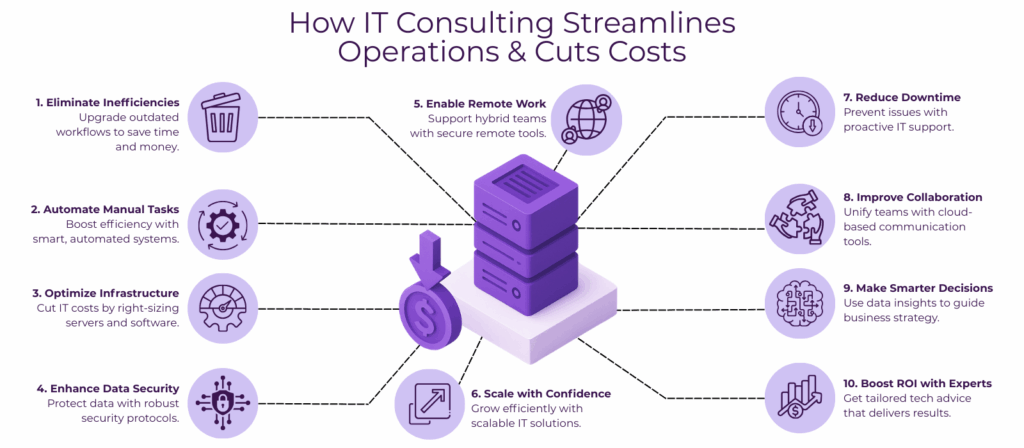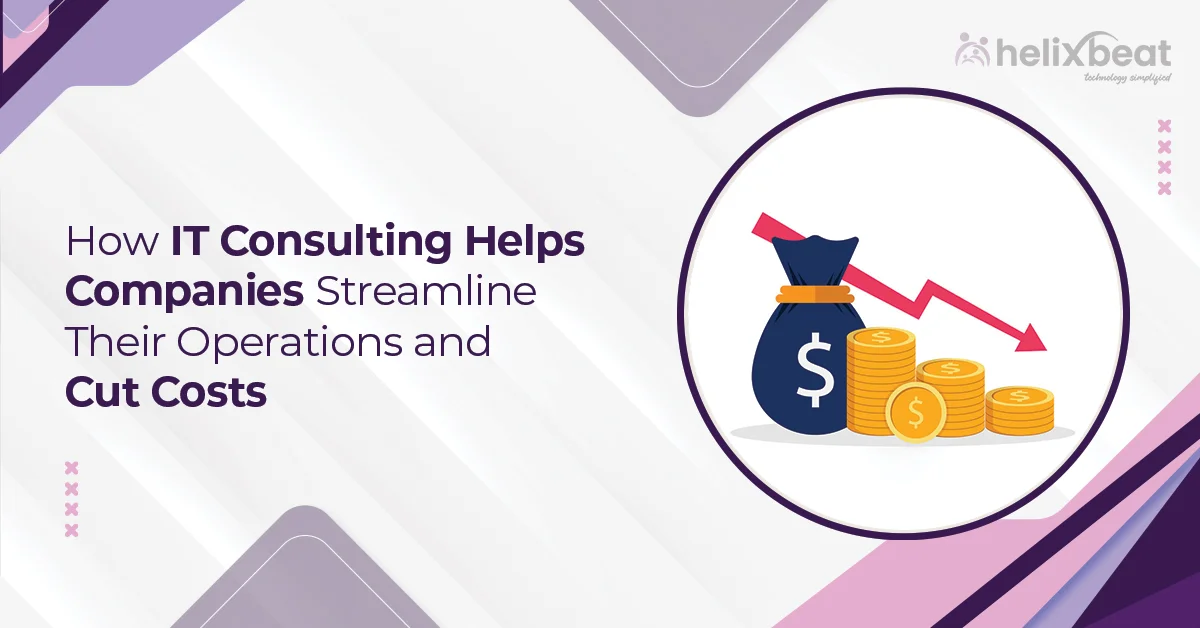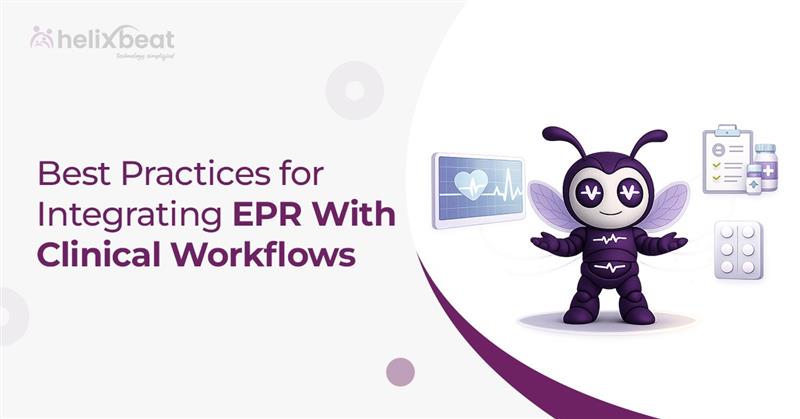Today, businesses are under constant pressure to stay efficient while keeping costs in check. With technology evolving rapidly, it’s not always easy to keep up, and many companies scramble to make the most of their resources. This is where IT consulting steps in, acting as a strategic lifeline for businesses aiming to cut costs and streamline processes.
In this blog, we’ll explore how IT consulting can be a real game-changer for businesses looking to boost efficiency and reduce expenses.

Table of Contents
1. Identifying and Reducing Operational Inefficiencies
Imagine a busy law firm that’s still sorting through endless paper files for client cases. One day, an IT consultant looks at the chaos and suggests going digital, with a secure cloud-based system to store and organize files. Now, instead of scrambling through stacks of paper, lawyers can access documents with a few clicks and free up time to focus on winning cases, not filing papers.
These changes don’t just reduce costs—they bring real-time savings, boost productivity, and improve overall efficiency.
2. Implementing Automation for Increased Efficiency
Automation is one of the most powerful ways to streamline operations and reduce costs. Imagine a small manufacturing company still using paper-based timekeeping for its employees. Every day, employees manually fill out timecards, and HR spends hours inputting the data into payroll systems. An IT consultant steps in, suggests a simple automated time-tracking system, and voilà—it cuts down hours of admin work, minimizes human errors, and makes payroll processing a breeze.
So, whether it’s automating manual tasks or eliminating unnecessary paperwork, IT consultants are key to making businesses run smarter.
3. Optimizing IT Infrastructure for Cost Efficiency
Imagine a company purchasing a massive server capacity because it expected rapid growth. However, after a year, it only uses a fraction of it, meaning it’s paying for unused resources. An IT consultant might step in and suggest downsizing the server or shifting some operations to the cloud. With cloud computing, companies can easily adjust their capacity based on actual usage, meaning they only pay for what they need. Think of it like renting a smaller apartment until you’re ready to move into a bigger one.
Similarly, many businesses find themselves paying for multiple subscriptions that do the same job when it comes to software. An IT consultant can help identify such redundancies and recommend a more consolidated software suite, so you’re not wasting money on things you don’t need.
4. Improving Data Management and Security
Data is one of the most valuable assets a company has—yet, mishandling or losing it can lead to expensive consequences. Without proper data management, the company risks losing customer trust or facing hefty fines for non-compliance with data protection laws. This is where IT consultants help companies safeguard their data and manage it more efficiently.
IT consultants can help set up robust protocols to guard against cyber threats. Healthcare organizations, for example, rely on consultants to implement multi-factor authentication, encryption, and firewalls to protect patient data. These proactive steps safeguard businesses from costly data breaches and loss of reputation.
5. Enabling Remote Work and Flexible Solutions
The shift to remote/hybrid work has created both opportunities and challenges for businesses. While remote work has helped companies reduce overhead costs, it also requires a reliable IT infrastructure to maintain communication, collaboration, and productivity. Therefore, IT consultants help businesses create secure, scalable solutions for remote work, making it easier for teams to collaborate regardless of location.
For example, IT consultants may recommend cloud-based collaboration tools like Microsoft Teams, Google Workspace, or Slack, which allow employees to communicate and share documents in real-time. Additionally, consultants can implement secure virtual private networks (VPNs) and multi-factor authentication (MFA), so remote employees can access company resources safely.
6. Supporting Scalability and Growth
As companies grow, their operational needs become more intricate. Thus, IT consultants help businesses scale their operations to meet increased demand while minimizing costs. They can help businesses identify areas where scalability is needed, such as customer support, supply chain management, or IT infrastructure.
For example, a business experiencing rapid growth might need to expand its customer support capabilities. An IT consultant can recommend implementing a customer relationship management (CRM) system that integrates with existing tools and processes. This allows the company to manage a larger customer base without increasing headcount.
7. Providing Ongoing Support and Maintenance
IT consultants not only help businesses set up their technology but also provide ongoing support and maintenance. This proactive approach prevents small issues from becoming major problems, which can lead to costly downtime.
By partnering with the right providers, businesses gain access to a team of experts who can quickly resolve technical issues, apply software updates, and make sure that systems are functioning optimally. This ongoing support reduces the need for in-house IT teams. Additionally, consultants offer training to employees to familiarize them with new systems and tools.
Why Businesses Choose Helixbeat for IT Consulting Services
Every business faces its own unique challenges. Whether you’re navigating cloud adoption, optimizing legacy systems, or exploring cutting-edge technologies like AI, IoT, etc., we bring clarity to complexity.
Our consultants are tech-savvy problem-solvers who work closely with your teams to identify gaps, remove roadblocks, and deliver customized solutions. Our IT Consulting Services cover:
- Digital Transformation Roadmaps
- Cloud Strategy & Migration
- Enterprise Architecture
- Cybersecurity Frameworks
- Infrastructure Modernization
- Software Development Consulting
- Data Strategy & Business Intelligence
From early-stage planning to implementation support, we guide you through every decision — translating tech into tangible business value.
Final Thoughts
IT consulting offers businesses a wide range of benefits regarding streamlining operations and cutting costs. By leveraging technology the right way, businesses can reduce operational costs, improve productivity, and scale their operations for future growth.
Whether you’re a small startup or an established enterprise, working with Helixbeat can unlock significant cost savings while driving innovation and efficiency. Contact us today to streamline your operations, improve decision-making, and achieve long-term success.
FAQs
1. How can IT consulting help reduce operational inefficiencies?
IT consultants evaluate your current systems, identify bottlenecks, and recommend improvements, such as automation or system upgrades, that will speed up and make your operations more cost-effective.
2. What are the benefits of implementing cloud-based solutions through IT consulting?
Cloud solutions allow businesses to scale their infrastructure based on demand, avoid expensive hardware costs, and only pay for what they use, resulting in cost savings and increased flexibility.
3. How do IT consultants help businesses manage remote work?
IT consultants help businesses set up secure, scalable remote work solutions, including cloud-based collaboration tools, VPNs, and multi-factor authentication, making remote work more cost-effective and secure.
4. How can IT consulting support business growth while minimizing costs?
IT consultants provide strategies for scaling operations efficiently, such as implementing CRM systems or optimizing supply chain management, so businesses can grow without significantly increasing costs.
5. What kind of ongoing support do IT consultants offer?
IT consultants provide continuous support by resolving technical issues, performing system maintenance, and offering employee training, which helps prevent downtime and keeps operations running smoothly at a lower cost.













